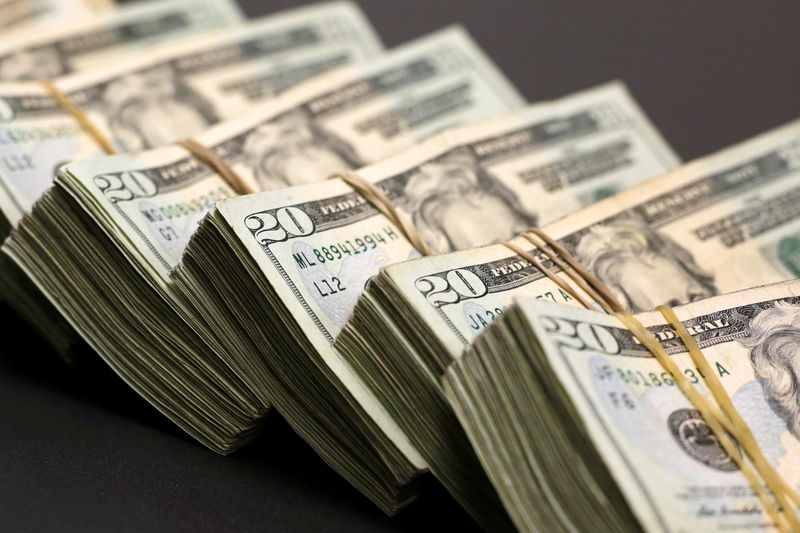(Recasts with weekly finish; updates prices; adds analyst
quote)
By Kate Duguid
NEW YORK, June 5 (Reuters) - The dollar was modestly higher
on Friday after data showed the U.S. labor market unexpectedly
improved in May, but the currency ended the week lower, for a
third consecutive week, as uncertainty about the U.S. economy
capped gains.
The Labor Department's employment report showed the jobless
rate fell to 13.3% last month from 14.7% in April, which was a
post-World War Two high. It came on the heel of surveys showing
consumer confidence, manufacturing and services industries
stabilizing. Economic conditions have significantly improved as
businesses have begun to reopen after shuttering in mid-March to
slow the spread of COVID-19. The U.S. dollar index =USD late Friday was up 0.18% to
96.93. It was down 1.4% from last Friday's close. On the day,
the dollar was 0.38% stronger against the euro EUR= , at
$1.129. Against the safe-haven Japanese yen JPY= , the dollar
was up 0.44% to 109.61 yen.
"Today you've seen better-than-expected economic data coming
out of the U.S. in terms of the jobs numbers," said Chuck Tomes,
portfolio manager at Manulife Asset Management. "The reaction on
the back of that has been expectations of better growth coming
out of the U.S. as well as a steepening yield curve, both of
which have provided a lift to the dollar."
The uncertainties about the economic outlook and the
possibilities of a second wave of infections had capped the
greenback's gains, Tomes added.
Some analysts said the May job gains in might not soon be
repeated.
"While this was no doubt a great jobs report, a lot of good
news was already priced in. Future estimates and expectations on
the economic rebound are likely higher from here and therefore
harder to meet or beat," said Matt Miskin, co-chief investment
strategist at John Hancock Investment Management.
The dollar's strengthening was less visible against the
euro, and in the dollar index, which heavily weights the euro,
after the single currency rose following the European Central
Bank's announcement Thursday that it was expanding its stimulus
program.
The euro jumped 1.73% this week, its third straight weekly
rise, though it was lower on the day.
- English (USA)
- English (UK)
- English (India)
- English (Canada)
- English (Australia)
- English (South Africa)
- English (Philippines)
- Deutsch
- Español (España)
- Español (México)
- Français
- Italiano
- Nederlands
- Português (Portugal)
- Polski
- Português (Brasil)
- Русский
- Türkçe
- العربية
- Ελληνικά
- Svenska
- Suomi
- עברית
- 日本語
- 한국어
- 简体中文
- 繁體中文
- Bahasa Indonesia
- Bahasa Melayu
- ไทย
- Tiếng Việt
- हिंदी
FOREX-Dollar lifted by jobs data, but records third straight weekly loss
Published 05/06/2020, 20:17
Updated 05/06/2020, 20:18
FOREX-Dollar lifted by jobs data, but records third straight weekly loss

Latest comments
Install Our App
Risk Disclosure: Trading in financial instruments and/or cryptocurrencies involves high risks including the risk of losing some, or all, of your investment amount, and may not be suitable for all investors. Prices of cryptocurrencies are extremely volatile and may be affected by external factors such as financial, regulatory or political events. Trading on margin increases the financial risks.
Before deciding to trade in financial instrument or cryptocurrencies you should be fully informed of the risks and costs associated with trading the financial markets, carefully consider your investment objectives, level of experience, and risk appetite, and seek professional advice where needed.
Fusion Media would like to remind you that the data contained in this website is not necessarily real-time nor accurate. The data and prices on the website are not necessarily provided by any market or exchange, but may be provided by market makers, and so prices may not be accurate and may differ from the actual price at any given market, meaning prices are indicative and not appropriate for trading purposes. Fusion Media and any provider of the data contained in this website will not accept liability for any loss or damage as a result of your trading, or your reliance on the information contained within this website.
It is prohibited to use, store, reproduce, display, modify, transmit or distribute the data contained in this website without the explicit prior written permission of Fusion Media and/or the data provider. All intellectual property rights are reserved by the providers and/or the exchange providing the data contained in this website.
Fusion Media may be compensated by the advertisers that appear on the website, based on your interaction with the advertisements or advertisers
Before deciding to trade in financial instrument or cryptocurrencies you should be fully informed of the risks and costs associated with trading the financial markets, carefully consider your investment objectives, level of experience, and risk appetite, and seek professional advice where needed.
Fusion Media would like to remind you that the data contained in this website is not necessarily real-time nor accurate. The data and prices on the website are not necessarily provided by any market or exchange, but may be provided by market makers, and so prices may not be accurate and may differ from the actual price at any given market, meaning prices are indicative and not appropriate for trading purposes. Fusion Media and any provider of the data contained in this website will not accept liability for any loss or damage as a result of your trading, or your reliance on the information contained within this website.
It is prohibited to use, store, reproduce, display, modify, transmit or distribute the data contained in this website without the explicit prior written permission of Fusion Media and/or the data provider. All intellectual property rights are reserved by the providers and/or the exchange providing the data contained in this website.
Fusion Media may be compensated by the advertisers that appear on the website, based on your interaction with the advertisements or advertisers
© 2007-2024 - Fusion Media Limited. All Rights Reserved.